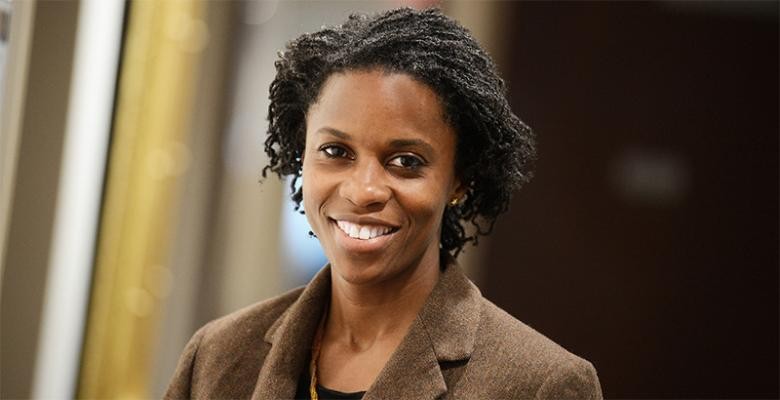5 Questions on the Midterms with Civil Rights Expert Olatunde Johnson

Olatunde Johnson, the Jerome B. Sherman Professor of Law at Columbia Law School and an expert in civil rights and constitutional governance, is worried.
“How can we restore a sense of common purpose, deal with intense partisanship and polarization and messages from the administration that are racially and ethnically divisive and indifferent or hostile to women?”
Johnson joined the Law School faculty in 2006 after serving as counsel to U.S. Senator Edward M. Kennedy on the Senate Judiciary Committee and working for the ACLU and the NAACP Legal Defense and Education Fund. She was a law clerk for David Tatel of the U.S. Court of Appeals for the D.C. Circuit and U.S. Supreme Court Justice John Paul Stevens. She has a J.D. degree from Stanford and a B.A. from Yale.
Q. What are the biggest issues facing a new Congress in terms of civil rights?
A. Many issues have implications for civil rights and economic justice, especially for people of color. Immigration policy, for starters—how to treat people who are undocumented and asylum seekers. Current deportation policy also involves civil rights. Communities are living in fear, which affects their ability to access basic services, to send their children to school, to report domestic violence and other crimes. Immigration reform should be a high priority for a new Congress. A new Congress also would have the power to correct weakening of various civil rights laws. For example, the current administration has pulled back on key Obama-era initiatives meant to strengthen enforcement of housing laws. Congress could act to strengthen remedies under the 1968 Fair Housing Act to promote integration and nondiscrimination in housing so enforcement isn’t so much at the whim of any particular administration. There is also the issue of discrimination in the military and whether there are federal employment protections on the basis of gender identity and sexual orientation. Until now, court decisions and administrative rulings have dealt with employment discrimination on the basis of sexual orientation and gender identity, but Congress can clarify the issue by enacting statutory protections. And Congress should find ways to address the widening economic gap through wage increases, tax policy, by strengthening worker-training programs and expanding affordable housing initiatives.
Q. Will voter suppression play a role in the coming election?
A. There are reasons to be concerned. A 2013 U.S. Supreme Court decision – Shelby County v. Holder - weakened the Voting Rights Act of 1965, effectively invalidating a requirement that particular states preclear certain voting changes. Some states that had previously discriminated against African Americans began to pursue such activities again, implementing voter ID requirements, purging voter rolls and closing polling places in or near minority communities. In last year’s Alabama election, we saw how African American turnout helped send Democrat Douglas Jones to the U.S. Senate. Minority turnout could again be important in the midterms.
Q. What’s being done to increase turnout?
A. Lawsuits have been filed by civil rights groups and complaints lodged about access to voting facilities, voter purging, and strict voter identification requirements. Georgia, with its close gubernatorial election, is ground zero for many of these complaints. An African-American Democrat is running against the Republican secretary of state who is responsible for enforcing Georgia laws that many people believe are suppressing the minority vote. There is litigation, but it is not clear that these cases will succeed in time for this election. Elsewhere, there are nonpartisan efforts to provide minority and low-income voters information about their polling sites, and explain how they can cast a provisional ballot, or what kind of ID to bring with them. Republicans and Democrats also have their own get-out-the-vote activities.
Q. What issues on the state level could be affected by this election?
A. Redistricting is usually done by state legislatures and there are ways to do it that don’t harm groups on the basis of partisan identity, race or ethnicity. A ballot proposal in Michigan would amend the state constitution to create an independent commission of Republicans, Democrats and independents who would be responsible for redistricting. Ballot measures or legislation at the state level also can deal with issues of economic inequality, such as raising the minimum wage, paid family and medical leave and parental leave. A number of states and localities have adopted such measures. Immigration and civil rights advocates are now more focused on reforms at the state level. States also provide alternatives to incarceration and end how bail systems harm people on the basis of income, race or ethnicity.
Q. What will it take to undo what the Trump administration is doing?
A. Many civil rights and constitutional issues are decided in court, but not every issue goes to the courts and there are ways to override what courts do. And once a particular administration shapes the direction of courts, it could take years or a generation, to undo these changes. Congress could change statutes to create different policies around immigration, around housing. In that sense it can undo what the current administration has put in place. But it would take a change in the Senate to have an impact on judicial appointments, and that looks unlikely at present.